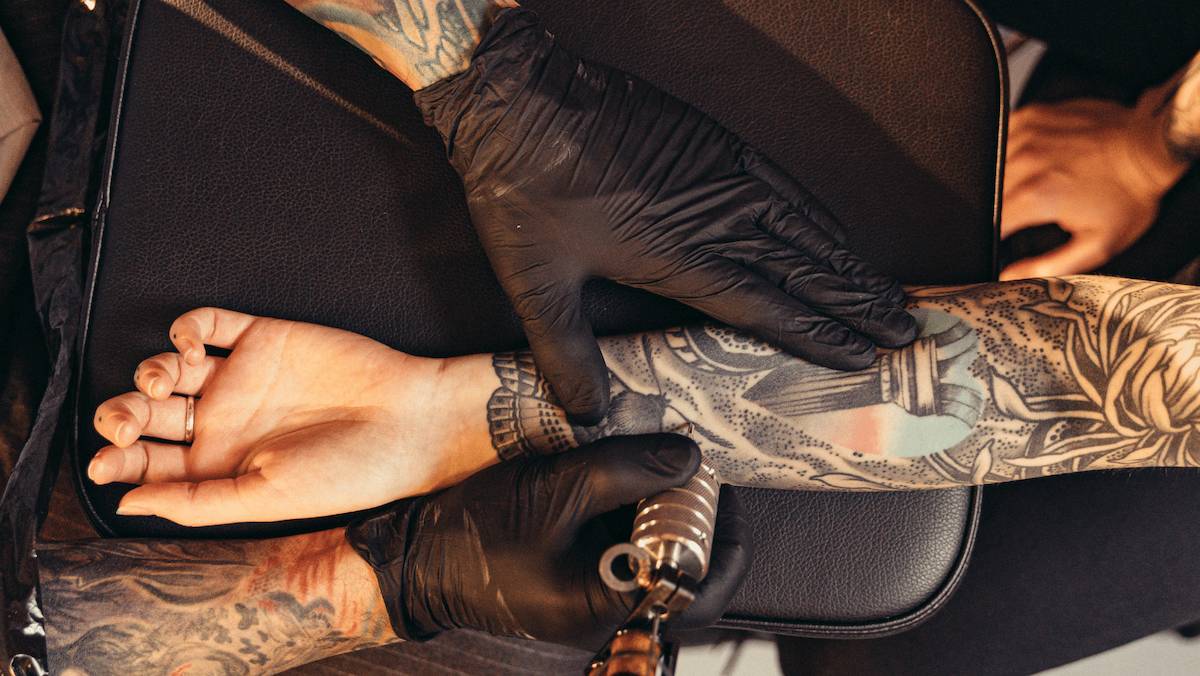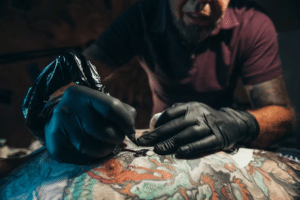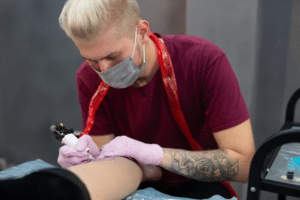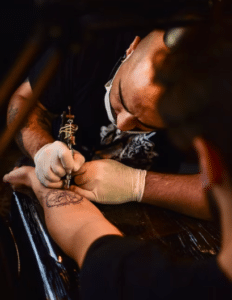
Are you interested in becoming a tattoo artist or body piercer? It takes more than just artistic talent to get a tattoo license.From age restrictions to bloodborne pathogen certification, there are a number of laws and regulations you must adhere to before setting up a shop. Begin your journey towards joining the ranks of professional artists and piercers with this guide on how to get a tattoo license.
Tattoo License Requirements
Aspiring tattoo artists must meet certain requirements in order to obtain a license.
Applicants must be 18 years of age or older, possess a high school diploma or equivalent certificate and provide proof that they have passed a bloodborne pathogen certification course.The
application fee for obtaining a tattoo license is $250 plus an additional $5 if you wish to have it printed and mailed to you. Renewing your license incurs an additional fee of $350 if it has expired within the past year.Once the application process is complete and the license approved,
it will be valid for one year after the date it was issued.After that time, you can renew your license for another year at the standard fee of $250. It’s important to remember that all laws and regulations regarding tattooing must still be adhered to in order to keep your license active.
Age Requirements For Professional Tattoo Artists And Body Piercing
The legal age to get a tattoo or body piercing in the UK is 18 years old. This requirement is designed to protect minors from making decisions before they are mature enough to do so.Professional tattoo artists and body piercers must be licensed in order to work, and the minimum age for obtaining these licenses is 18 as well. In some cases, a parent or legal guardian can give permission for their child to receive minor body art, provided that the child is at least 16 years of age.Without written consent from a parent or legal guardian, no professional artist should provide any kind of body art services to anyone under the age of 18.
Application Requirements For Licenses
Individuals interested in obtaining a license to perform professional tattooing and body piercing must
submit an application with the Department of Licensing, including all required documents. The application can be completed online or mailed in with a check or money order for the $250 fee and a copy of their bloodborne pathogens training certificate.Applicants must also
provide photo identification and proof of United States citizenship. Upon approval, applicants will receive their licenses within two weeks.All licenses must be renewed annually, and applicants will need to provide current proof of bloodborne pathogens training before their renewal is approved. It is important to note that failure to keep up with the requirements can result in suspension or revocation of the license.
Bloodborne Pathogen Certification For Professional Tattoo Artists And Body Piercers
Bloodborne pathogen certification is an important requirement for professional tattoo artists and body piercers. It ensures they are trained in proper sterilisation techniques, cross-contamination prevention, and the correct response to needle stick injuries.All applicants must submit proof of bloodborne pathogens training with their application to the Department of Licensing. Without this certification, applications will be denied, or licenses may be suspended or revoked upon renewal.The official
OSHA training can be found online, and local Departments of Health may provide additional information on safety regulations and sterile procedure techniques. Obtaining a bloodborne pathogen certification is essential for all professionals in the tattooing and body piercing industry.
Requirements To Open Tattoo Shops
Tattoo shops face strict requirements before they can open and begin business. To get a license to open a tattoo shop, the owner must meet certain criteria outlined by the state. This includes
submitting proof of bloodborne pathogens training, having all equipment properly disinfected between each use and having any reusable equipment sterilised in an autoclave.In addition, records must be kept of all procedures performed, and customer contact information must be maintained. Lastly, the county has the right to inspect any shop at any time without notice.Meeting these regulations is essential for safe practices and client satisfaction. With the proper training and adherence to standards, tattoo shops can provide quality services while protecting clients from harm.
Importance Of Getting A Tattoo License

Here are the important reasons you should consider getting a professional tattoo artist license before starting work:
Legal Requirements
In many places,
it is illegal to perform tattoos without a license. Getting a license ensures that you are operating within the legal guidelines of your jurisdiction.
Health And Safety
A tattoo license typically requires
training in proper sanitation and sterilisation techniques to prevent the spreading of infections and diseases. This helps ensure the safety of both the tattoo artist and the client.
Professionalism
Obtaining a tattoo license
demonstrates your commitment to your profession and your willingness to meet industry standards. This can help build trust with clients and other professionals in the industry.
Opportunities
Many tattoo studios only hire artists who have a valid license, so
having one can increase your chances of finding employment in the industry.
Conclusion
Overall, obtaining a tattoo license is an important step towards becoming a professional and responsible tattoo artist. Now you know how to get a tattoo license. Good luck on your journey towards helping people express themselves through unique body art.
FAQ
Can you fly with a tattoo machine?
Yes, you can. Devices containing lithium metal or lithium-ion batteries should be carried in carry-on baggage. Most other consumer devices containing batteries are allowed in carry-on and checked baggage. For more information on portable electronic devices, see the FAA regulations.
Are permanent tattoos allowed in airports?
Permanent tattoos are allowed if they are not on the visible body part. And further, it is also dependent on the profile that you are looking for. In case you are looking for a cabin crew job, then the first clause applies. Otherwise, if you are looking for a ground job, it can be avoided in certain circumstances.
Which country does not allow tattoos?
Vietnam. Much like Japan and China, Vietnam has a history of associating tattoos with criminals and gangs. This is still very much a prevalent attitude, particularly in rural areas and among older residents.
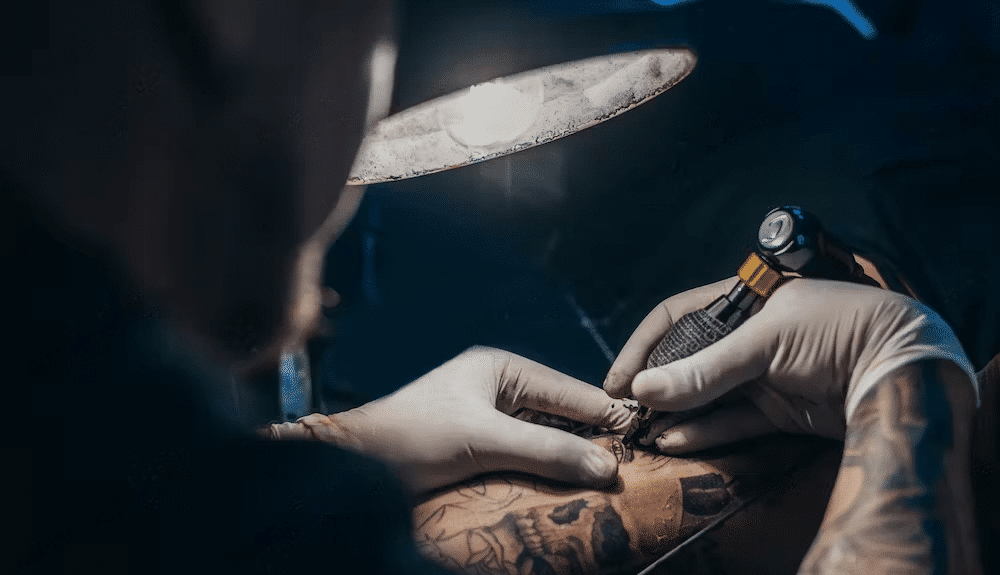 Are you interested in becoming a tattoo artist or body piercer? It takes more than just artistic talent to get a tattoo license.From age restrictions to bloodborne pathogen certification, there are a number of laws and regulations you must adhere to before setting up a shop. Begin your journey towards joining the ranks of professional artists and piercers with this guide on how to get a tattoo license.
Are you interested in becoming a tattoo artist or body piercer? It takes more than just artistic talent to get a tattoo license.From age restrictions to bloodborne pathogen certification, there are a number of laws and regulations you must adhere to before setting up a shop. Begin your journey towards joining the ranks of professional artists and piercers with this guide on how to get a tattoo license.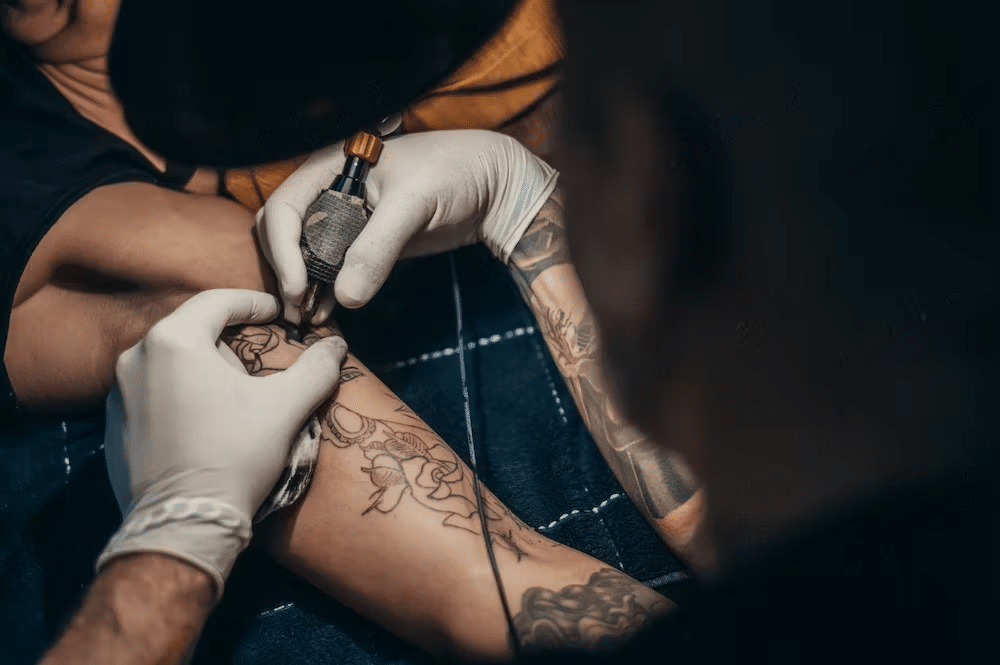 Here are the important reasons you should consider getting a professional tattoo artist license before starting work:
Here are the important reasons you should consider getting a professional tattoo artist license before starting work:
